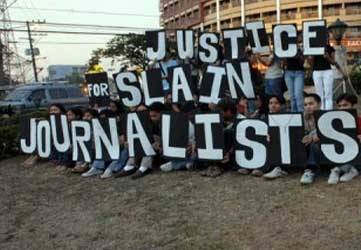
PARIS (Reporters Sans Frontières/Pacific Media Watch): Reporters sans frontières deplores the fatal shooting of radio journalist Romeo Olea in Iriga City (in Camarines Sur province, south-east of the capital).
Aged 49, Olea was gunned down on June 13 as he was driving by motorcycle to the station where he worked as a programme host, Radio dwEB, located in the nearby municipality of Nabua.
“We extend our condolences to Olea’s family and friends,” Reporters Without Borders said.
“His murder is another tragic example of the complete lack of security for media workers in the Philippines and shows that the ‘super body’ that the justice minister created last year to reinforce efforts to combat violence against journalists has been insufficient.
“The authorities cannot continue to ignore the dangers to which the country’s courageous journalists are exposed. After the Maguindanao massacre, in which 32 journalists were killed, President Aquino’s government gave a few signs of trying harder to combat impunity. Nonetheless, it must take firmer measures to put a stop to contract killings and, in particular, to protect the journalists it knows be under threat.”
Shot twice
Police sources said gunmen shot Olea twice in the back at around 5.30 a.m. yesterday. He was immediately rushed to Rinconada Medical Centre, where he died 30 minutes later.
He hosted a programme called Anything Goes in which he commented on current affairs and local politics. None of the stories he had covered has so far been linked to his murder.
Another Radio dwEB journalist, Miguel Belen, was gunned down as he was returning to his home in Iriga City on 9 July 2010. Using a similar modus operandi, two men on a motorcycle fired at least four shots at him. He died in hospital from his injuries a few days later.
The day after the Belen shooting, Justice minister Leila de Lima told National Press Club representatives she had ordered the creation of a “super body” to deal with attacks on journalists.
A special unit, called Task Force 211, was already created in 2007 with the aim of preventing and solving cases of political violence.
The media freedom situation continues to be critical in the Philippines, which was ranked 156th out of 178 countries in the latest Reporters Without Borders press freedom index.



